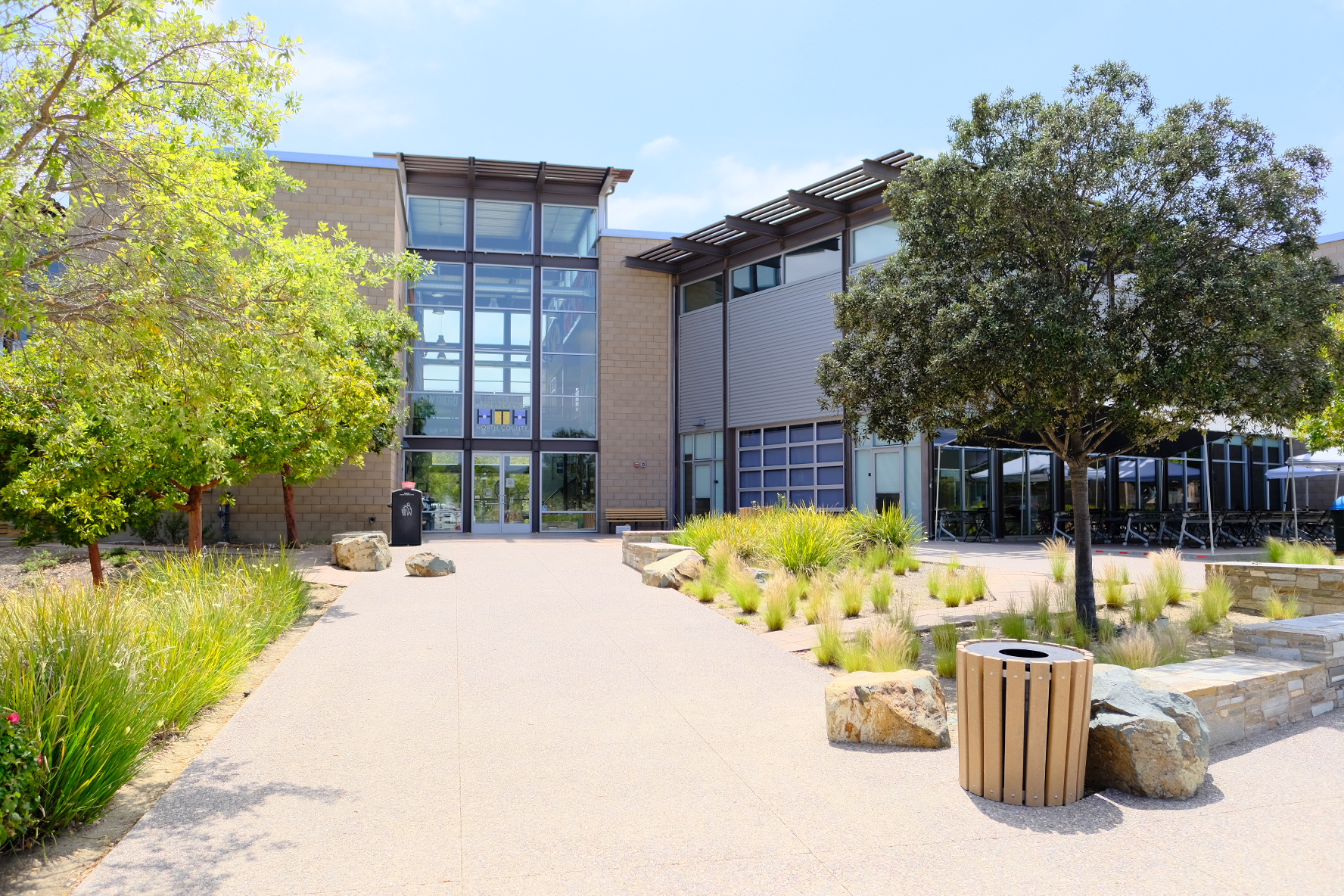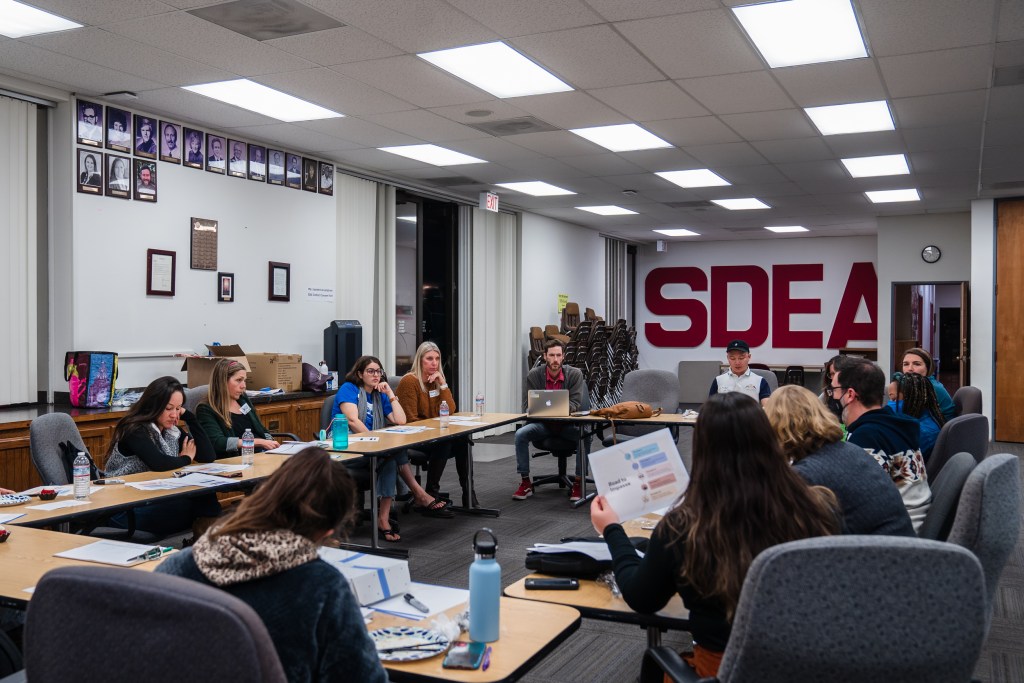There’s one thing people on both sides of High Tech High’s heated union negotiations seem to agree on – they love the schools and their unique approach to teaching.
“I love my job,” Caitlin Cohen, a math teacher at High Tech High, said at a special Board of Trustees meeting in mid-November. “I love the school I work at. I love my coworkers, my students, my curriculum, my administration – all of it. But I do deserve due process in the workplace. I deserve equity and I deserve the respect (of) being shown that I am valued, not just told that I’m valued.”
It was the first board meeting since 89 percent of the union’s members approved a resolution of no confidence in the board as negotiations stalled. The union “no longer has confidence in the High Tech High Board of Trustees’ ability to lead our schools in a manner that aligns with its design principles,” wrote Hayden Gore, president of the school network’s union, in a letter to the board chair.
Criticism of the board and High Tech High management at that November meeting was fierce, after High Tech High and the union’s bargaining teams failed to finalize a contract. Some teachers called the failure to reach a deal thus far “embarrassing,” and some parents said it’s made them question whether they made a good choice sending their children to High Tech or whether they should suggest the schools to their friends.
“Was it all hype?” said one High Tech High parent.
The union and school management reached agreement on most points, including pay and health benefits, but deadlocked on the final points.
A key sticking point is who has final say if a teacher fired for cause were to appeal their firing. High Tech High leadership wants it to be the charter’s CEO, while the union is pushing for a panel with representatives from the union, school leadership and a neutral third party. Teachers fear that without a more neutral appeal process, they’ll be stuck with a de facto at-will employment system that could negate any of the benefits they bargained for.
That deadlock was so significant that at that November meeting, the board declared an impasse, which will lead to a state-appointed mediator overseeing further negotiations.
High Tech High opened its first public charter school in 2000 and has since expanded to become the largest charter school network in the county, with 16 schools and more than 6,000 students. The charter network has become a leader in the project-based learning sphere, a teaching style that uses personalized individual or collaborative projects to teach students concepts or skills rather than standard curriculum.

Last year, staff at High Tech High joined a growing number of charter schools around the county and state that have unionized. Since January, the union has been bargaining with High Tech High on issues ranging from health benefits to pay, which has historically been significantly lower than some neighboring traditional public schools.
High Tech High officials insist they’ve moved quickly, but the union says the bargaining has been slow and marred by interference from leadership. Shortly after teachers voted to unionize, High Tech High fired a teacher who had been vocal about the efforts, sparking the first of two unfair labor practice charges the union has filed against the charter network. California’s Public Employment Relations Board, which handles collective bargaining disputes, decided in favor of the union on that charge, and a later charge against High Tech High for bargaining in bad faith.th.
In a statement sent to Voice of San Diego and community members, High Tech High CEO Kaleb Rashad wrote that management believes they have proposed a contract that provides significant improvements to pay, benefits, evaluations and job security.
“We have consistently maintained that we want to provide everything we can to our amazing teachers, and at the same time, keep our students and families at the forefront of all of our decisions,” Rashad wrote.

High Tech High’s influence in the project-based learning world has drawn teachers from across the country. Gore, the recently elected president of the High Tech Education Collective, the union representing High Tech High staff, had long admired High Tech High before moving his family from Texas to work at the charter school. His two sons also attend High Tech High schools.
“From the teacher perspective, we see a place that we love that we’ve invested so much of ourselves in, but we’re watching it crumble, and what we’re trying to do is sound the alarm,” Gore said. Even among charter schools, which have long had far less experienced teachers than traditional public schools, the inexperience of High Tech High teachers stands out. The charter network did not respond to questions about its staff retention numbers, but according to data gathered for Voice of San Diego’s 2021 Parent’s Guide to Schools, High Tech schools have some of the most inexperienced teachers of any school in the county.
The just over four years of average teaching experience at High Tech High schools is more than 10 years less than the average teaching experience at San Diego Unified schools. And of the over 600 schools throughout the county for which average years of teacher experience was collected, 10 of the 13 schools with the least experienced teachers were High Tech High campuses.
Research shows experienced teachers yield better in-classroom results. Some High Tech High teachers argue experience is especially vital for project-based learning, where teachers have autonomy to create projects to teach students rather than relying on pre-built curriculum. Experienced teachers with institutional knowledge to help new teachers are essential, said Gore. But teachers say High Tech High’s inexperienced staff stems from the network’s ability to fire teachers without appeal, and because the network pays teachers less than districts like San Diego Unified.
Jennifer Harris has two children at High Tech schools and loves its project-based learning model. But as her children have grown, she feels the strength of the projects have decreased and the sense of community at the schools has degraded. She thinks the revolving door of teachers is to blame.
“In August, (my son) was really excited to go back to school. And he realized that first day that as he was walking through the halls … that he had no teachers there who recognized him. Not one that could say, ‘Hey, how’s it going? Nice to see you back,’” Harris said.
Despite the progress made toward a deal, the negotiations pushed former High Tech High teacher Julie Ruble to her breaking point. Like Gore, she’d followed High Tech High for years while teaching in North Carolina. She moved to San Diego for the charter’s in-house graduate school, which awards educators teaching credentials and master’s degrees, in the hope of eventually landing her “dream job” there. That dream came true, and she worked at a High Tech High for five years.
Ruble loved working there, and when the union formed, she said she felt full of hope. To her, the union felt like a project the teachers were working on together, in the same way her students worked on projects.
She joined the bargaining committee but said she left every meeting demoralized. That disillusionment was compounded by High Tech High’s messaging that it places equity at the forefront of what it does.
“That disconnect between what High Tech High is in the classroom versus what was happening in those bargaining meetings was so intolerable to me that I thought, ‘even if they negotiate an incredible fair contract, which I firmly believe that they will, I will never be able to forget this.’”
That experience is why she recently quit her dream job. But even given what she knows now, Ruble said she doesn’t regret moving across the country to teach at High Tech High.
“Mostly because I think the project work that my students and I have done together has changed the world. It’s changed my students. It’s changed me,” Ruble said.
Correction: A previous version of this article stated that High Tech High had 10 of the 11 schools in the county with the lowest levels of average teacher experience. The actual number is 10 of the 13 schools in the county with the lowest levels of average teacher experience.


So the boss wants the ability to fire you for cause.
Terrible!
Good lesson for the hth students, this is life in the real world.
My wife and I once taught in the New York City public school system, which was heavily unionized. We saw, first hand, how a union can go too far in protecting teacher’ jobs, to the point of protecting those who were incompetent or undedicated to their work. The quality of education suffered. We have had 3 grandchildren attend High Tech, and are very happy with the education they received. We hope the new union doesn’t mess it up1
My son attends HTH and I love that the teachers are young and excited to teach. The issue with traditional schools is that teachers are unionized and can’t be fired. The teaching suffers. However, I believe the teachers should be paid fairly and perhaps more oversight on the firings should be explored.
I think that if you look deeper into the budget of High Tech High you will find that they can’t function if they retain good teachers and pay them a fair wage because the charter school system isn’t sustainable without the exploitation of labor.
@craig ‘Cause?’ One of the most sighted reasons for firing is that the teacher ‘doesn’t fit the culture.’ That can mean anything. HTH gives almost no feedback to teachers. They just mount pressure. These teachers are making their own curriculum and rubrics for grading. That takes a ton of time. Most of them are making below minimum wage with zero support.
@Barry Getzel I’m very happy that you have had such a great personal experience, that doesn’t make a good argument for keeping the status quo. Slavery had good outcomes for some at the top, but it wasn’t a good system for all.
@Mikki Thank you for holding the belief that ‘perhaps’ more oversight should be explored.
Rise up Desi, Rise up! Yes, advocating to revoke those charters will liberate those teachers from the jobs they sought out. Schools are fundamentally about labor. Anyone who thinks teaching is a noble profession about serving kids has been duped.
Thanks for posting this info.